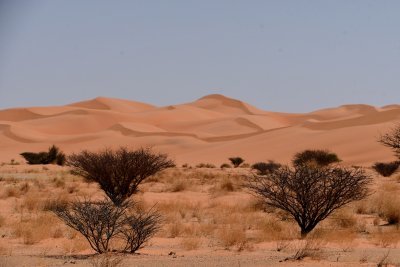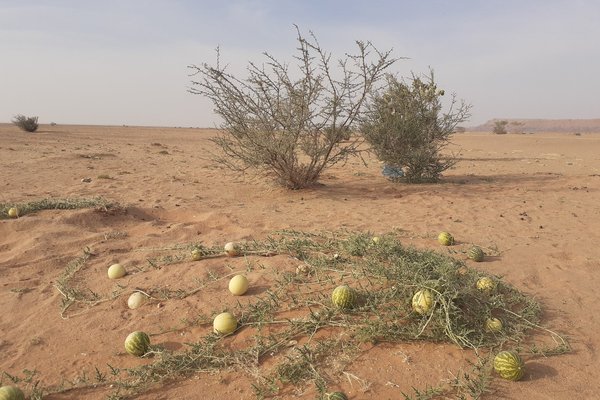Saudi Arabia
'Uruq Bani Ma'arid
'Uruq Bani Ma'arid covers the western part of the largest sand sea on Earth, the Ar-Rub' al-Khali (Empty Quarter).
The site covers over 1.27 million ha of hyper-arid desert landscape, with various dune formations. It also includes the southern end of the Tuwayq limestone escarpment with its many wadis and salt flats. Arabian Oryx, Arabian Sand Gazelles and Arabian Mountain Gazelles have been successfully reintroduced in the reserve.
Community Perspective: Randi describes a visit with a tour by a park ranger, after acquiring a permit beforehand.
Site Info
Official Information
- Full Name
- 'Uruq Bani Ma'arid (ID: 1699)
- Country
- Saudi Arabia
- Status
-
Inscribed 2023
Site history
History of 'Uruq Bani Ma'arid
- 2023: Inscribed
- Inscribed
- Type
- Natural
- Criteria
- vii
- ix
Links
- UNESCO
- whc.unesco.org
All Links
UNESCO.org
- whc.unesco.org — whc.unesco.org/
Community Information
- Community Category
- Natural landscape: Desert
Travel Information
One thousand visitors or fewer
Reservation required
Recent Connections
-
IUCN Green List
2025 -
Perfect Inscriptions
2023 -
Sir Wilfred Thesiger
Travelling the Empty Quarter (Rub' al K…
Connections of 'Uruq Bani Ma'arid
- Individual People
-
-
Sir Wilfred Thesiger
Travelling the Empty Quarter (Rub' al Khali)See prmprints.com
-
- Ecology
-
-
Ergs
"35 longitudinal sand dunes (‘uruq in Arabic) reach up to 200 km in length and rise up to 170 m in height." (AB ev) -
Hyper-arid
"Criterion (vii): 'Uruq Bani Ma'arid is an iconic hyper-arid sand desert" (OUV) -
Salt Flats
"sebkha (salt flats)" (AB ev) -
Reintroduced Species
Arabian Oryx (1993), "Today, 150 Oryx are present" (AB ev). The Arabian Sand Gazelle (Gazella marica), also assessed as Vulnerable, and the Endangered Mountain Gazelle (Gazella gazella) have also been reintroduced to the site since 1995. -
Dunes
"It contains one of the world’s largest longitudinal sand-dune systems" (AB ev)
-
- World Heritage Process
-
-
WHC locations
Inscribed during the session in Riyadh in 2023. -
Natural sites filling gaps cited by IUCN
"its inscription would be a starting point to address a significant gap on the World Heritage List under criterion (ix) as it would be the only property to represent the Arabian Desert Udvardy Province." and "would also fill a gap on the World Heritage List following the delisting of the Arabian Oryx Sanctuary World Heritage property (Oman)." (AB ev) -
Perfect Inscriptions
2023
-
- WHS on Other Lists
- Visiting conditions
-
-
One thousand visitors or fewer
"The total number of visitors to the protected area since 2013 reached a total of 1,058 persons, which is low considering the vast nominated area." (AB ev) -
Reservation required
Needs a permit from the National Center of Wildlife (NCW)
-
News
No news.
Recent Visitors
- Piotr Wasil
- Alexander Lehmann
- Zoë Sheng
- Svein Elias
- Randi Thomsen
- Jarek Pokrzywnicki
- Martina Rúčková
Visitors of 'Uruq Bani Ma'arid
Community Reviews
Show full reviews
This is a UNESCO World Heritage Site that I was very excited to visit, located at the edge of the legendary “Empty Quarter.” Desert landscapes have always fascinated me. However, obtaining information in advance about how best to visit the national park proved challenging. I came across a forum thread online that mentioned a permit was required beforehand.
I reached out to NCW, explaining our wish to visit and the date we had planned for the trip. The following day, I received a polite response asking me to send copies of the passports for all visitors. A day later, I received an email confirming our request for permission has been approved, and informing that they had arranged a guided tour for us!
At the designated day, after our unsuccessful attempt to visit Al Faw, we headed to the Uruq Bani Ranger Station. Here, we were warmly welcomed with tea, Saudi coffee, and dates. Clearly, they were expecting us! After completing the visitor registration, we set out on a tour with a ranger in his jeep.
From the ranger station, several routes into the desert were marked with signs, but it quickly became apparent that «the roads» didn’t last long, and familiarity with the area was essential. We followed the Arabian Oryxtrail, and the ranger, who spoke a little English, explained as best he could.
The landscape was stunning. We saw several large sand dunes, areas with shrubs, and even spotted a gazelle. It is quite common …
Keep reading 0 comments
